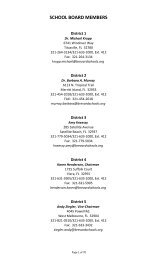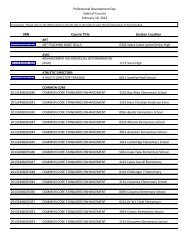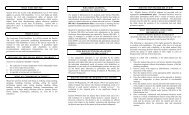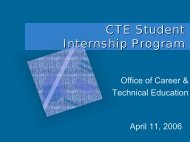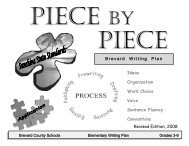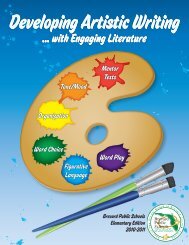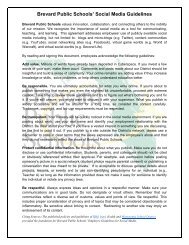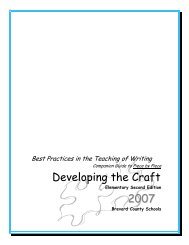2007-08 K-12 Comprehensive Research-Based Reading Plan
2007-08 K-12 Comprehensive Research-Based Reading Plan
2007-08 K-12 Comprehensive Research-Based Reading Plan
Create successful ePaper yourself
Turn your PDF publications into a flip-book with our unique Google optimized e-Paper software.
intervention course. A high school student who scores at Level 1 or Level 2 on FCAT<strong>Reading</strong> but who did not score below Level 3 in the previous 3 years may be granted a1-year exemption from the reading remediation requirement; however, the student musthave an approved academic improvement plan already in place, signed by theappropriate school staff and the student's parent, for the year for which the exemption isgranted.Passing scores on FCAT and concordant scores on other assessments may not be usedto exempt students from required intervention. Districts may use flexibility to provideintervention to students in grades 11 and <strong>12</strong> who have met the graduation requirement(1926 on FCAT or concordant score). Courses that may be used to provide readingintervention to 11th and <strong>12</strong>th grade students include <strong>Reading</strong> for College Success,English 4-College Prep, or Intensive <strong>Reading</strong>. Each of these three courses focus on thegoal of providing instruction that enables students to develop and strengthen readingcomprehension of complex grade level texts and developing independent cognitiveendurance while reading. Other commonalities include a focus on understandingvocabulary in context, recognizing various rhetorical structures, identifying main idea,inferences, purpose, and tone within texts. While all three courses require the reading ofboth fiction and nonfiction texts, <strong>Reading</strong> for College Success provides a specific focuson informational text while English 4 provides a specific focus on literature.High school students who score at Level 1 or Level 2 on FCAT <strong>Reading</strong> and who haveintervention needs in the areas of decoding and/or text reading efficiency must haveextended time for reading intervention. This extended time may include, but is notlimited to, students reading on a regular basis before and afterschool with teachersupport, or for students two or more years below grade level a double block of readingto accelerate foundational reading skills and to apply these skills with increasinglycomplex texts. This teacher should be highly qualified to teach reading or workingtoward that status (pursuing the reading endorsement or K-<strong>12</strong> reading certification) andclassroom infrastructure (class size, materials, etc.) should be adequate to implementthe intervention course.This reading intervention course should include on a daily basis: whole group explicit and systematic instruction small group differentiated instruction independent reading practice monitored by the teacher infusion of reading and language arts benchmarks specific to the subject areablocked with the intensive reading course (biology, world history, etc.) a focus on increasingly complex literary and informational texts (exposition,argumentation/persuasive, functional/procedural documents, etc.) at a ratiomatching FCAT 2.0 Item Specifications.Schools must progress monitor students scoring at Level 1 and 2 on FCAT <strong>Reading</strong> aminimum of three times per year. This should include a Baseline, Midyear, and End ofthe Year Assessment.As a reminder, each struggling reader must be given the instruction that best fits his orher needs. Districts must establish criteria beyond FCAT for placing students into35 | P a g e




